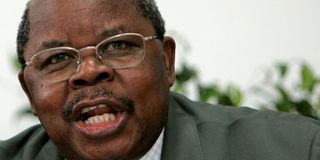The Citizen’s first editorial by Benjamin Mkapa

What you need to know:
- This new English daily joins many others published in Dar es Salaam, giving Tanzania the reputation of being among countries with a large number of news papers in Africa.
Tanzania’s third phase President Benjamin Mkapa was a staunch believer in free media for he believed citizens had a right to know what the government was doing and the only way was through the media.
Below is the editorial that he wrote for the first edition of The Citizen newspaper on September 16 2004 when he called upon the newly born paper to uphold professional journalistic practices.
Karibu, The Citizen
I should like to extend my sincere congratulations to the proprietors, management, editors and reporters and all those working at Mwananchi Communications Limited for bringing out The Citizen.
This new English daily joins many others published in Dar es Salaam, giving Tanzania the reputation of being among countries with a large number of news papers in Africa.
I do not think this is a reputation that all Tanzanians are proud of; but whatever may be the case, one thing is certain: the multitude of Tanzanian newspapers (both in English and Kiswahili) provides readers with a wide choice of what newspapers to read and what to ignore.
Will The Citizen be the readers’ newspaper of choice? This is the question.
People read newspapers for a variety of reasons. I believe that the majority of readers buy newspapers in order to know what is going on around them, and elsewhere in the world. Besides getting to know what has happened or is happening, they are also provided with commentaries and features analysing those events.
When I addressed a seminar on ‘Open Government and the Media’ in Bagamoyo early last year, I said that the media are the bridge between the government and the governed; that they are the mechanism for interaction and forum for the exchange of ideas in society.
For The Citizen to be a reliable bridge, it has to have a solid foundation and great capacity to collect information, verify it, analyse it and Present it well to its readers.
The new daily will be free to report good or bad news as reality demands. I want to assure the Citizen and the media as a whole, which we in government will continue to uphold the freedom of the media and the people’s right to know what the government is doing on their behalf.
We delight in the good news but we are also able to cope with uncomfortable news.
But what disappoints me is an obsession by a certain section of the media to concentrate only on the negative and ignore the positive.
I know the dictum that news is about man biting dog and rather than vice-versa, but to ignore developments in the provision of service to the people, in the building of the country’s infrastructure and improvements in people’s lives is not responsible journalism.
As I said in my Bagamoyo address, it is an insult to the intelligence of our people to confer upon them an unquenchable appetite for scandal, and for gory tales of crime and decadence.
When anyone makes mistakes, or commits scandals they should be exposed and solutions or even punishment suggested in accordance with the rule of law.
A serious paper such as what we expect The Citizen to be, has to maintain the highest standards of journalism.
Besides reporting news-good or bad-we expect the paper to educate people on issues affecting their development, issues such as globalization and the HIV/Aids pandemic and to enlarge public understanding of uncomfortable problems.
Where the paper feels it has to give an opinion in an editorial or feature article, such opinions should be prompted by facts; facts should not be twisted to suit the opinion.
To earn respect and trust of its readers the new paper has to have well trained journalists, capable of digging for facts , able to present both sides of the story as opposed to assertion, or impressionistic and cynical reporting, which threatens to lower the ranking of journalists below that of second hand car-dealers.
As a former journalist, I am distressed by some of the stuff I read in our newspapers.
I should like to suggest, therefore, that a scheme of serious training for young journalists and even old timers be instituted to restore that reputation and dignity of journalism in our society.
By choosing the name The Citizen for your newspaper, you have placed on your editorial shoulders a heavy responsibility- the responsibility of being a good citizen of this country.
We have tried in Tanzania to evolve a national character, and national values that any good citizen has to expouse, has to be guided by, and has to be ready to defend zealously.
I encourage you to understand these values, so work for them and to be ready to be measured against them.
I am assuming that the new daily will strive to be a good citizen of Tanzania and a serious paper- the product of conscious editorial policy decision that will make sure that I will always want to read The Citizen.
Benjamin William Mkapa




